UK's first Lord Jagganath Hindu temple opens in Bath
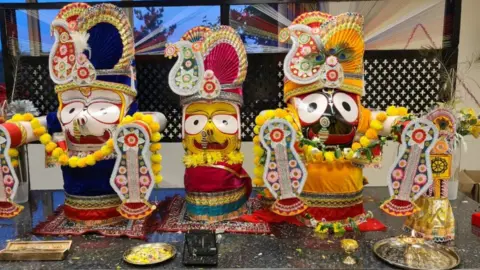 Shree Jagganatha Temple UK
Shree Jagganatha Temple UKThe first Hindu temple in the UK dedicated to Lord Jagganath has opened thanks to efforts by devotees.
It has been set up at the former Culverhay School in Rush Hill, Bath by Shree Jagannatha Temple UK group and the Bath Hindu Community.
Bath Hindu Community member Ashish Rajhansha said: "For us it's like a dream of a lifetime that's come true having a temple in Bath."
Lord Jagganath is celebrated with an annual festival in the summer.
"We had this dream for a long time, about 15 to 17 years but it couldn't have been possible without the help of Shree Jagannatha Temple UK," said Mr Rajhansha, who lives in the city.
Lord Jagganath is considered to be an incarnation of the second god in the Hindu triumvirate, Lord Vishnu, the preserver and protector of the universe.
He is celebrated in the Jagganath Rath Yatra or Chariot Festival held in June or July.
Devotees pull an idol of Lord Jagganath and his elder brother Balabhadra and sister Subhadra along on a colourful, decorated chariot through the streets.
In India, the main Lord Jagganath temple is in Puri, Odisha and dates back to the 11th Century where the Chariot Festival normally draws in thousands of people.
Founder member of Shree Jagannatha Temple UK, Pratap Prusty, from Bury St Edmunds, Suffolk said: "The Jagganath culture has a massive following in India.
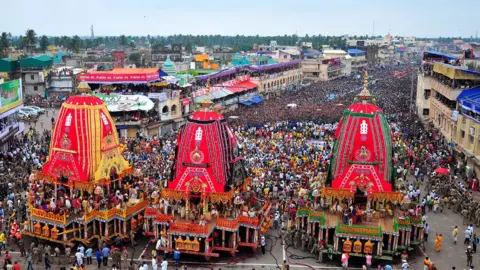 AFP Contributor
AFP Contributor"In the United Kingdom there are lots of Hindu temples and usually what happens in Hinduism is we have multiple gods and their different followers - that's how Hinduism is.
"So a group of friends, devotees - we travelled to some of the UK temples and found there wasn't a temple dedicated to Jagganath.
"Jagganath was there as a 'side' deity so there weren't any proper Jagganath ceremonies or Jagganath puja (ceremony) so that's where the idea came in.
"There are so many devotees around the country in the UK and Europe who love and follow Lord Jagganath so we wanted to try and form a temple in his name."
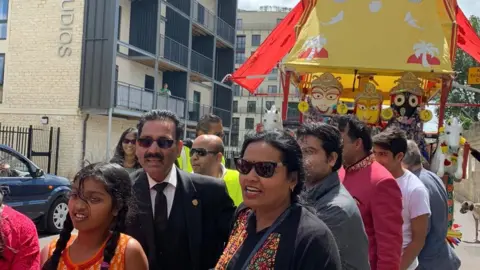 Bath Hindu Community
Bath Hindu CommunityThere are thought to be about 1,700 Hindus who live in the Bath area and both groups - Bath Hindu Group and Shree Jagganatha Temple UK, have also connected with and won further support from the Bath Interfaith Group.
Mr Kar, from Biggleswade, in Bedfordshire is one of the nine founding members of the Shree Jagannatha Temple UK which has 40 or so members.
He said that devotees made the pledge to set up the temple during last year's Chariot Festival.
"It happened swiftly because we received unconditional support from the Bath Hindu Community who had been trying to establish a Hindu temple in Bath for the past 13 years," he said.
"Now we can attract donors and members which can help the sustainability of the temple and help build a strategic temple in Bath."
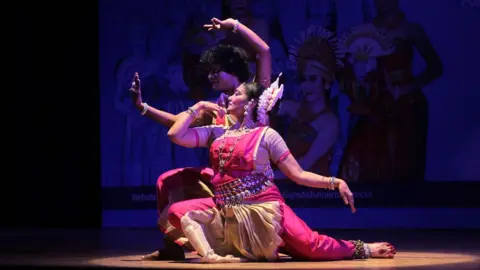 NurPhoto/Getty Images
NurPhoto/Getty ImagesIn the longer term, the group intends to buy land in Bath for a permanent temple site and will keep fundraising towards that goal in the meantime.
As a result no target amount has yet been set but fundraising efforts have started for the new temple build and organisers hope to raise more awareness during this year's Chariot Festival due to be held on or as close to 12 July, depending on Covid-19 regulations.
Founding member, Sushmita Pati, from Basingstoke, Hampshire said: "Lord Jagganath is also the lord of arts and culture.
"There are eight classical forms of dance in India. Odissi is one of the oldest, and it is very closely connected with Lord Jagganath and the chauka position which actually means salutation to the Lord.
"Dance is an integral part of the Jagganath culture - it's not on the side, in a little room, it's in the main temple.
"So when the actual temple is constructed in a couple of years' time my role is to ensure the dance arena is there."
Ms Pati also hopes to build on her existing work running workshops for schools and organising trips to Hindu temples for more children to learn about the Jagganath culture.
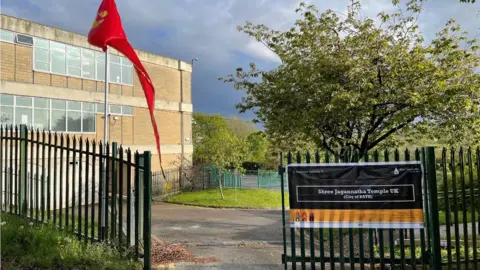 Arun Kar
Arun KarThe temple based at the former Culverhay School site opened on 22 May as the Covid crisis unfolded in India.
Consultant at the Royal United Hospital Dr Sharath Gangadhara, said: "My parents and most of my family live abroad in India so we've not been able to visit them and have felt isolated.
"I have been lucky enough to go to work every day but there have been a lot of people tied inside their house, not being able to go outside apart from exercise, working from home, with the stress of having children at home.
"We're all sitting in a pressure cooker - we all need a point of release, a place of spirituality, a community centre - we need it and it's come at the right time.
"It's made a huge difference, I can see people being engaged.
"It's not just a temple, it's a place where you can discuss issues that are going on with your close friends and family and find solutions and find that inner peace."
He said the temple would also help to bring the community together offering a space where people could practise yoga, dance and the arts.
In India, Jagganath temples also see Muslims being made welcome there.
Mr Prusty from the Shree Jagannatha Temple UK said: "I grew up in India, I'm used to going with different faiths and celebrating with them - so I go to a church, or temple if I have to.
"So that kind of flexibility is already there and we're really trying to achieve that in Bath and make that interfaith and inclusive as best as we can."
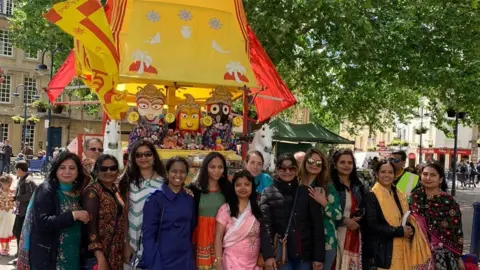 Bath Hindu Community
Bath Hindu Community
Follow BBC West on Facebook, Twitter and Instagram. Send your story ideas to: [email protected]
